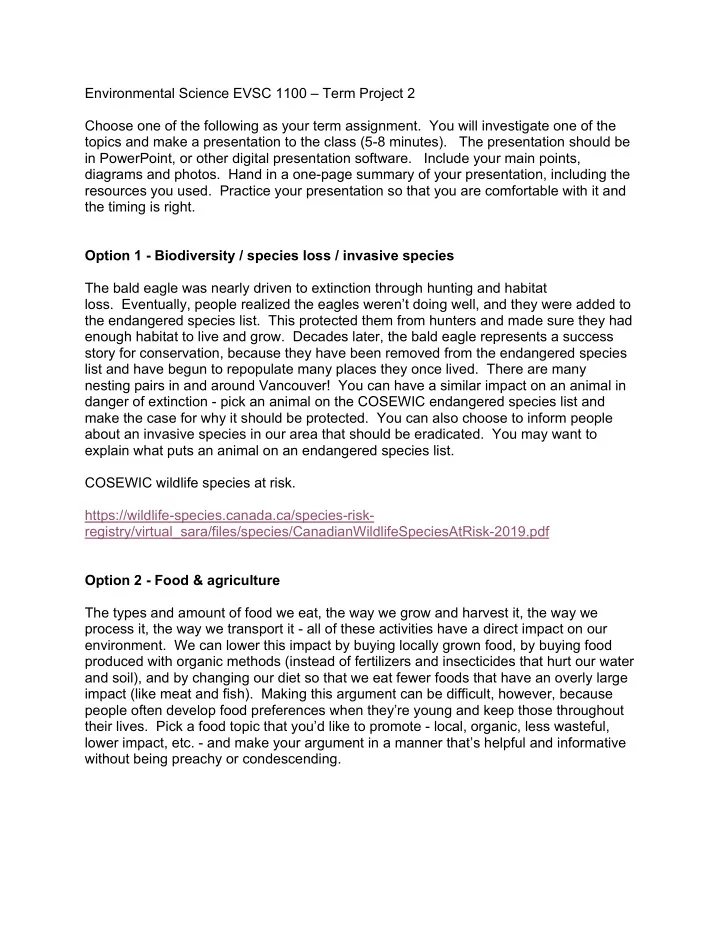

Environmental Science EVSC 1100 – Term Project 2 Choose one of the following as your term assignment. You will investigate one of the topics and make a presentation to the class (5-8 minutes). The presentation should be in PowerPoint, or other digital presentation software. Include your main points, diagrams and photos. Hand in a one-page summary of your presentation, including the resources you used. Practice your presentation so that you are comfortable with it and the timing is right. Option 1 - Biodiversity / species loss / invasive species The bald eagle was nearly driven to extinction through hunting and habitat loss. Eventually, people realized the eagles weren’t doing well, and they were added to the endangered species list. This protected them from hunters and made sure they had enough habitat to live and grow. Decades later, the bald eagle represents a success story for conservation, because they have been removed from the endangered species list and have begun to repopulate many places they once lived. There are many nesting pairs in and around Vancouver! You can have a similar impact on an animal in danger of extinction - pick an animal on the COSEWIC endangered species list and make the case for why it should be protected. You can also choose to inform people about an invasive species in our area that should be eradicated. You may want to explain what puts an animal on an endangered species list. COSEWIC wildlife species at risk. https://wildlife-species.canada.ca/species-risk- registry/virtual_sara/files/species/CanadianWildlifeSpeciesAtRisk-2019.pdf Option 2 - Food & agriculture The types and amount of food we eat, the way we grow and harvest it, the way we process it, the way we transport it - all of these activities have a direct impact on our environment. We can lower this impact by buying locally grown food, by buying food produced with organic methods (instead of fertilizers and insecticides that hurt our water and soil), and by changing our diet so that we eat fewer foods that have an overly large impact (like meat and fish). Making this argument can be difficult, however, because people often develop food preferences when they’re young and keep those throughout their lives. Pick a food topic that you’d like to promote - local, organic, less wasteful, lower impact, etc. - and make your argument in a manner that’s helpful and informative without being preachy or condescending.
Option 3 – Soil Soil is truly the cradle of life. We simply could not exist without healthy soils, yet as a species, we frequently mistreat them. We over-fertilize, we use harmful pesticides and insecticides, and we allow it to run off with stormwater down into streams, rivers, lakes and oceans. Making the argument that soil - dirt! - is important can be a challenge, so your task will be to inform your peers about why soil matters. Think of its importance to agriculture, buildings, and life in general, and see if you can make the argument for dirt! Option 4 - Renewable Energy Despite their popularity and promise of clean energy, alternative (renewable) energy sources are under attack. Politicians argue against clean power by saying it punishes coal plants and will raise everyone’s electric and fuel bills. The fossil fuel industry is very powerful and influences the Canadian economy on a large scale. Investigate one type of renewable energy - solar, wind, bioenergy, hydroelectric - and make the case for why we should install more of it in British Columbia. Option 4 – The environmental movement Rachel Carson is one of the founders of the environmental movement. She was exceedingly observant, and diligent in her research of the science behind environmental contaminants such as DDT. She also presented her findings in a readable, logical and convincing manner. Soon, DDT was banned from use in agriculture. Investigate one of the popular environmental agencies – Greenpeace Canada, Western Canada Wilderness Committee, or the David Suzuki Foundation. What is their main approach for implementing environmental change? Do they implement sound arguments based on science? How do they disseminate information, and recruit support? Option 5 – Humans trying to work with ecosystems The general scheme of humans has been, and still is, growth and expansion. Our growing population is taking up more and more space on the planet. We tend to try and change the environment to suit us. For example, in the first years of exploration by Europeans, acclimatization societies would try and change new territories (like New Zealand) to be more like their environments in Europe by introducing songbirds from home. They also brought goats and pigs to release so that food would be available for the next explorers. Would it not have been better for the people to acclimatize to the new environments, and try to change themselves to fit in? Investigate how, in this day and age, humans can try to work with ecosystems, such as composting, organic gardening, land reclamation, rebuilding degraded lands, and tree-planting projects.
Option 6 - Population growth The population of the earth is increasing, in spite of declines in birth rates. Just like any other species, there is a carrying capacity for humans, but predictions of that number or when that may happen are numerous. Curbing population growth is a controversial topic; however, determining trends and distribution of the human population, and factors that contribute to population growth is a good start. Compare population growth in Canada, the United States, and Mexico. What are differences in birth rates, mortality at different ages, socioeconomic conditions, access and adherence to birth control methods, female fertility trends, female education and autonomy, teenage pregnancy, longevity, immigration/emigration trends?
Recommend
More recommend